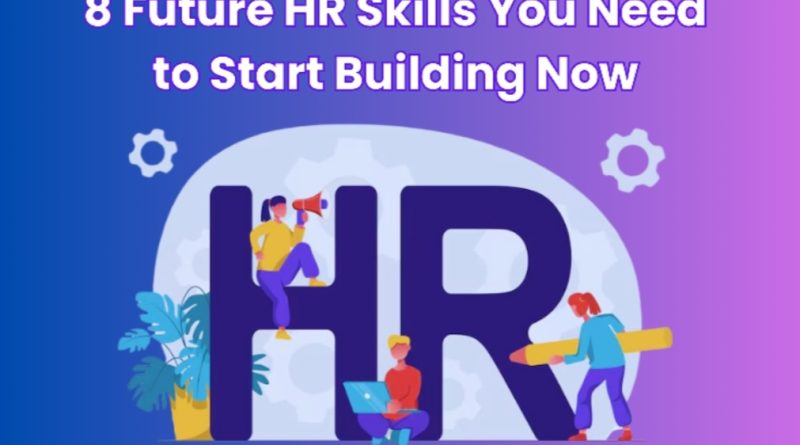8 Future HR Skills You Need to Start Building Now
The workplace is changing rapidly, and Human Resources (HR) professionals must adapt to stay relevant. With evolving business landscapes, emerging technologies, and shifting employee expectations, the demand for advanced HR skills is more significant than ever. To keep up, HR professionals should consider taking a comprehensive Human Resource Course that covers essential skills for the future workplace. This blog explores the critical Human Resource Skills needed to thrive in the coming years and why they matter.
Table of Contents
- The Need for Evolving HR Skills
- Top 8 Future HR Skills
- Conclusion
The Need for Evolving HR Skills
Human Resources roles are no longer just about hiring and firing. The future workplace demands HR professionals who can think strategically and adapt to constant change. HR must align its strategies with overall organisational goals as businesses grow more complex. Understanding digital transformation, fostering employee engagement, and managing diversity are some challenges requiring a new set of human resources skills. Therefore, the below-mentioned human resources skills will help shape the future of HR management. Developing these skills will enable HR professionals to navigate the challenges of the modern workplace effectively and drive organisational success.
Top 8 Future HR Skills
Effective HR management extends beyond operational duties. Developing a strategic mindset and adopting skills that improve people management are integral components to this process. The following essential human resources skills will powerfully shape the future of HR.
Strategic Thinking and Planning
Human Resources has become a vital partner in the industry. HR professionals need to go beyond the scope of daily operations and understand the broader perspective. Strategic thinking includes synchronising HR goals with corporate objectives and formulating plans for long-term success. This includes talent management strategies, succession planning, and workforce development programmes. Human resource professionals with strategic thinking skills can effectively manage future challenges and achieve organisational success.
Adaptability and Change Management
The future workplace is characterised by rapid transformation. Human resources professionals must possess adaptability in response to economic changes, technological progress, and worldwide pandemics. Change management is an essential competency that entails effectively leading a company through transition periods. This includes maintaining employee expectations, restructuring teams, and maintaining morale during times of transition. HR executives who demonstrate exceptional adaptability can cultivate a resilient and prosperous workforce that thrives amidst uncertainty.
Diversity and Inclusion Management
Human resources professionals must acquire the necessary expertise to manage and advance diversity and inclusion in the workplace efficiently. This requires comprehending cultural disparities, addressing unconscious bias, and creating an inclusive atmosphere where individuals feel appreciated. Talent management executives who advocate for diversity can cultivate an innovative and productive staff. Proficiency in this skill is growing in significance in the interconnected global workforce.
Communication and Interpersonal Skills
Robust communication serves as the fundamental support for efficient HR administration. Verbal and written communication skills are essential for HR professionals to effectively communicate rules, resolve disputes, and engage with employees at every hierarchical level. It is equally important to possess interpersonal skills, as they enable the development of a cohesive work environment, administrating employee relations, and building trust. Corporate culture and employee satisfaction can be enhanced through transparent, empathic, and honest communication.
Conflict Resolution and Mediation
Conflicts are inevitable in any professional setting, and the ability to manage them effectively is a crucial human resources skill. Human resources professionals must be adept at identifying conflicts early, understand the underlying issues, and facilitate discussions to settle them peacefully. Practical mediation abilities are crucial for achieving fair outcomes and maintaining team harmony. Influential HR leaders with conflict resolution skills can proactively avoid minor conflicts, fostering a more cohesive work environment.
Talent Acquisition and Management
Experienced HR professionals must be skilled in talent acquisition tactics beyond conventional recruitment operations. This includes understanding employer branding, using social media for recruitment, and implementing data-driven hiring strategies. Furthermore, talent management includes cultivating employee development through training, mentorship, and career development programmes. Effective talent management results in a highly motivated and high-performing staff.
Legal Compliance and Ethical Practices
Human resources experts must have extensive knowledge of employment rules and regulations to ensure the organisation’s compliance. This entails understanding labour laws, occupational safety regulations, and anti-discrimination measures. Moreover, the HR department should promote ethical practices by developing and enforcing codes of conduct. Legal and ethical competence safeguards the organisation from legal actions and enhances its reputation. A comprehensive understanding of these factors is crucial for upholding trust and integrity inside the organisation.
Performance Management and Feedback
Achieving employee productivity requires implementing effective performance management. Human resources professionals must possess skills in setting clear expectations, providing regular feedback, and conducting fair evaluations. Providing constructive criticism enables people to enhance their performance and develop professionally. The responsibility of HR is to establish a transparent performance evaluation system that inspires employees and aligns with the company’s goals. This ensures a high-performance culture that supports business growth.
Conclusion
The future workplace demands HR professionals equipped with diverse skills, from digital literacy to emotional intelligence and strategic thinking. A human resources course covering these areas is invaluable for those looking to improve. Professionals must embrace continuous learning and skill development to thrive in the evolving HR landscape. The Knowledge Academy provides resources for HR teams to stay well-equipped and achieve lasting success.

